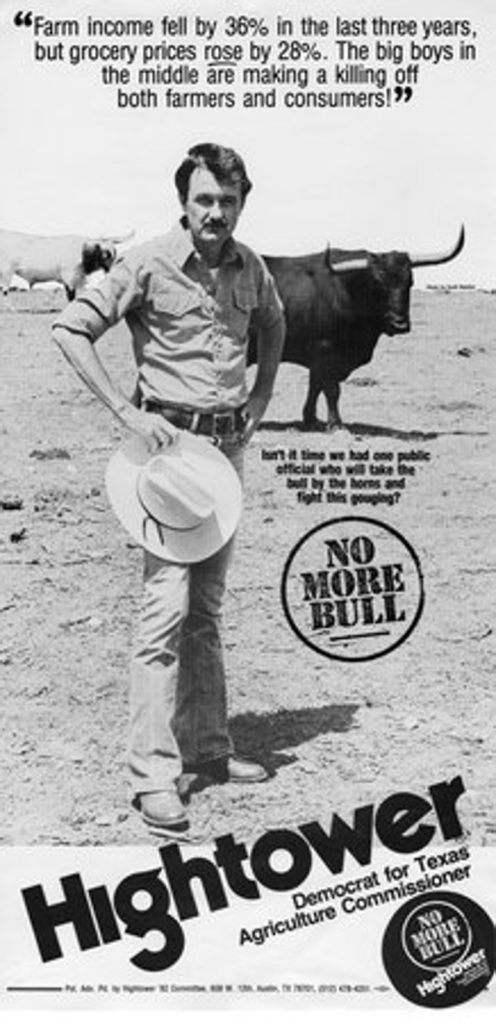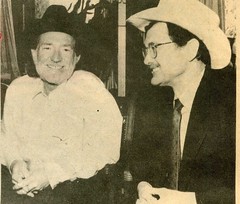
PHIT New Project
Hightower Campaign Poster
The Hightower Years
Farms on Fire
The Texas Camelot
PHIT is beginning a new oral history project. The project title is still a work in progress, but the subject matter is pretty solid. We are collecting participant stories on the impact that the Texas Department of Agriculture made on state and national policies during the years that Jim Hightower was Commissioner. Those years were 1983-1991.

The 1980s was the high-water mark for progressive politics in the state of Texas. In 1983, Ann Richards, Garry Mauro, Jim Mattox and Jim Hightower, all politically progressive, were elected to state-wide office. In a glorious moment of celebration, the four them walked arm and arm up Congress Avenue to get inaugurated.
In the years since, Ann Richards has been the subject of a biography. Molly Ivins is celebrated in a play. Mauro and Mattox ran more prestigious agencies and received more subsequent press attention.
Hightower was elected to two terms of office at the Texas Department of Agriculture. In those eight years, Hightower, and an amazing team of activists and policy analysts that he recruited and enabled, created a legacy of agricultural achievements that created models the pattern for the rest of the country.
Yet his legacy has been mostly neglected and his successors at the TDA have virtually written Hightower and his achievements out of history.
PHIT has begun an oral history project to recover that history. And an incredible history it is. This, my friends, is the PHIT mission statement. To collect and preserve and to tell the story of the neglected and under-represented segments of Texas history.

Hightower came into office in the midst of the most severe agricultural credit crisis since the Great Depression. The family farm and the family ranch was facing extinction.
Reagan, the Farm Bureau, the United States Department of Agriculture all were working avidly and gleefully to increase the average size of the farm in order to make it more “efficient and productive.” And they were more than willing to sacrifice the family farm for massive exports and cheap cattle.
The Texas TDA became the focal point of opposition to that strategy. The Texas TDA battled the Farm Bureau, battled the USDA, battled the Reagan-Bush administration.
The mission statement of the Texas TDA was to create an agricultural environment that would be safe for the consumer, safe for the farmworker, safe for the earth and would permit the family farmer and rancher an opportunity to make a profit.
In response to the death of farmworkers due to pesticide exposure, the TDA established the nation’s first pesticide application regulations.
The TDA created the first official state organic produce regulations and produced the first official organic certification stamp. The federal government was forced to respond to this initiative by creating its own national standards.
The TDA battled the Department of Energy when it wanted to create a nuclear dump site in Deaf Smith County, the most valuable agricultural land in Texas.

The TDA helped Texas farmers diversify by creating effective marketing. They supported the fledging wine industry with professional marketing and championed local herbs and local flower industry. They helped promote a Christmas tree industry, helped develop a Texas blueberry industry, an export mushroom operation. Texas produced zero pinto beans until the TDA helped a panhandle farmer start marketing them.
They helped create coop farms, spread farmer’s markets throughout Texas.
They advocated for national farm bills to control production and guarantee fair prices for farmers.
The fledging wind industry was hatched in the TDA halls.
The list could go on.
PHIT is currently conducting oral interviews to collect the TDA participant stories. In this Blog, we will present highlights of those interviews.
Eventually, we will begin work on a documentary.
Documentaries cost money
So save your pennies and nickels, because PHIT will, by the end of this year, set up a Gofund me site, and we will be asking for donations and selling coffee mugs, and T-shirts, and maybe even some of the lovely and quirky Texas craft souvenirs that TDA sponsored in the good old days.